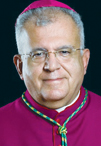By KIM VAN OOSTEN
CHA representative members have a new tool to measure and assess their ministry identity and mission integrity. The CHA Ministry Identity Assessment resource is the product of two-plus years of discernment, development and field testing. It builds on more than 40 years of foundational work by CHA and its members to articulate objective criteria for assessing the effectiveness of Catholic health care facilities as ministries of the church.

Sr. Carol
"CHA members asked that as an association, we reflect and rearticulate our core commitments," said CHA President and Chief Executive Officer Sr. Carol Keehan, DC. This first-of-its-kind, proprietary CHA resource fulfills that request. It represents hundreds of hours of work by CHA staff and members of a dedicated CHA task force made up of sponsors, mission leaders and ethicists from across the country. The resource sets out a comprehensive, fully detailed process for conducting a ministry identity assessment and drafting a continuous quality improvement plan. It is available only to CHA system representative members. They can download it at chausa.org/chamissionidentityassessment or order a print edition by calling the CHA Service Center at (800) 230-7823.
Inclusive process
"The process can be used to assess an individual health care facility, acute and non-acute care settings, a regional subsystem or a health system as a whole," said Brian Smith, CHA's senior director of mission innovation and integration. Smith oversaw a majority of the work to create the tool and is the primary author of the 292-page manual.

Smith
The evaluation process described in the manual involves all levels of an organization including frontline staff, middle management, patients or residents of continuum-of-care facilities, executive leaders, board members and sponsors.
The CHA Ministry Identity Assessment includes a formation component that distinguishes this tool from a traditional compliance audit, according to Smith.
Sr. Carol added, "It is a process meant to form people to better understand what it means to be a ministry of the church and how our service and work embodies our core commitments to bring God's healing love to the world."
Said Smith: "This is not about checking a box and seeing if we are doing everything by the book. This involves all levels of the organization reflecting on how our mission and core values are being demonstrated every day through the services we provide our patients, residents and associates."

McConnaha
"Through assessment of policies, procedures, existing data and anecdotal evidence, Catholic health ministries will consider the extent to which the values and commitments of Catholic identity are lived out in their organization, identify strengths and opportunities for growth and then develop a plan for continuous quality improvement that can be shared with staff, boards, sponsors, bishops and dicasteries of the church," Smith said.
The assessment process is neither prescriptive nor definitive. It is intended to augment rather than supplant ministry assessment processes and tools already in use by CHA members. And, according to Smith, since health ministries operate in a dynamic marketplace where advances in technology and changes in health care delivery and health care finance impact patient care, the manner in which mission is manifested should be assessed and fine-tuned on an ongoing basis as part of a ministry's pursuit of continuous quality improvement.

Lincoln
Development of the resource
The request for a common structure and resource that could be used to identify and measure elements of Catholic identity came at a 2016 CHA meeting of sponsors, mission leaders and chief executives. CHA assembled a task force to meet the request. They evaluated mature ministry assessment tools in use by ministry members and consultants who provide third party assessment services. The group identified the Gospel and theological values that undergird ministry identity and agreed that foundational elements of Catholic social teaching are essential to a church ministry.
The task force determined that the following seven core commitments laid out in CHA's "A Shared Statement of Identity for the Catholic Health Ministry" are essential elements of ministry identity:
- Promote and defend human dignity
- Attend to the whole person
- Care for the poor and vulnerable
- Promote the common good
- Act on behalf of justice
- Steward resources
- Act in communion with the church

Garrett
To assess a ministry's performance against those criteria, the CHA task force adapted the framework for achieving performance excellence that is part of the Malcolm Baldrige National Quality Award program. The task force created a total of more than 100 key performance indicators relevant to the core elements. A ministry organization may add key performance indicators of its own after talking with key stakeholders such as bishops or board members. The organization can choose to undertake all or part of the assessment according to its needs and priorities.
Task force member Scott McConnaha is president and chief executive of Manitowoc, Wis.-based Franciscan Sisters of Christian Charity Sponsored Ministries. "Having a consensus around the core elements of Catholic identity will bring clarity to the mission assessment process and allow for apples-to-apples comparisons within and between ministries," McConnaha said. "Any bishop should be able to look at a Catholic identity assessment prepared by or for a health ministry member and understand how a measurement was derived and where performance falls on a scale."
David R. Lincoln is president and chief executive of Tewksbury, Mass.-based Covenant Health, one of four pilot sites for the ministry identity assessment process. He said that the process gave Covenant the opportunity to engage internal and external stakeholders. It opened insights into the many ways mission is "alive today at Covenant," and exposed opportunities for expanding and strengthening mission.
"Our discussions were collaborative in nature, and quite frankly, inspirational," he said.

Archbishop DiNoia
Alan H. Garrett is the recent past president and chief executive officer of St. Joseph Health St. Mary in Apple Valley, Calif., and regional vice president of St. Joseph Hoag Health, part of Providence St. Joseph Health. He said in its pilot of the assessment tool St. Joseph Health St. Mary found the process to be revelatory.
"It also gave us a clear lens with which to evaluate our ministry," he said. "We found we are a shining example of Catholic health care in some areas and a bit tarnished in others. Now we can create a blueprint for improvement."
Based on the pilots, Smith estimates the assessment process will take three to four months. Depending on the size of the organization and the number of people involved, an organization should expect to invest 1,000 to 1,500 hours of staff time.
Archbishop J. Augustine DiNoia, the adjunct secretary of the Vatican's Congregation for the Doctrine of the Faith, reviewed the Ministry Identity Assessment manual and the experience of the four ministries that tested the assessment process. In an endorsement letter reprinted in the manual's prologue, he wrote: "I am impressed by the level of honesty and transparency the key performance indicators require. Looking at the daily operations and decisions of the health ministry from the lens of CHA's core commitments will make the mission and values of Catholic health more relevant for all involved in the process. Finally, seeing ministry identity as part of an organization's continuous quality improvement is an excellent way to assure accountability and fidelity to the mission of the church."
Illustrations place Catholic health care in a community context
The illustrations in the CHA Ministry Identity Assessment are an expansion of original art commissioned for "A Shared Statement of Identity for the Catholic Health Ministry," which CHA published in 2000. Those foundational values guide the ministry today.
The original illustration depicts the Gospel story of the healing of the paralytic. In the story, the friends of a paralyzed man bring him to Jesus. Unable to get through the crowd, they lower him from a rooftop. With the help of his friends, the man is healed by Christ and restored to the wider community.
For the ministry assessment resource, CHA sought to emphasize that Catholic health care is part of the fabric of the communities it serves. CHA expanded the original art to show villagers witnessing the miracle and tending to the tasks of daily life. The CHA Ministry Identity Assessment extracts seven visual vignettes from the art and uses those images to emphasize each of the core elements in the manual.
— Kim Van Oosten
What leaders say about the CHA Ministry Identity Assessment tool

Prybylo

Boyle

Sr. Haddad
"I think it is important to have a physician leader on the steering team for the
Ministry Identity Assessment. One of our doctors suggested an additional key performance indicator: utilization rate of tests ordered in the emergency department. It is data we already collect, and this helps our physicians see how their work is connected to stewarding the resources of our organization."
—
Mary Prybylo, senior vice president of
Covenant Health and president of
St. Joseph Hospital"In the end, the purpose of this whole activity isn't just performance indicators or that they look good on a score sheet, but we're here, as I always say, so that all boats float, that individuals and groups flourish together. In the end, this is about our true identity, that we're called to create a transforming healing presence in our communities and that, in my estimation, is the common good."
—
Philip J. Boyle, senior vice president of mission and ethics,
Trinity Health"In Catholic health ministry, we're called to not only heal those who have health needs, but also to help persons be restored into the community. Our ministry is a sign of God's healing and reconciling love in our world. And I think that we're being called through this assessment process to recognize the ways that we're doing that, where the gaps are and where we can perhaps give more attention to how we are that restoration of the community, how we bring people to fullness."
— Sr. Mary Haddad, RSM, CHA vice president of sponsorship and mission services
For information on ordering the CHA Ministry Identity Assessment, please contact the CHA Service Center at [email protected] or (800) 230-7823.